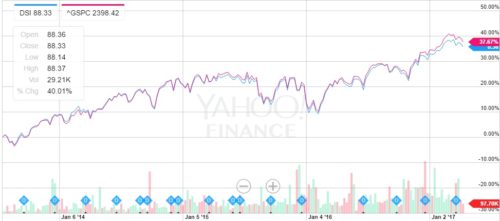Sustainable investing, also known as SRI and ESG investing, is an investment style that considers the impact of a company on the environment, community and employees of a company. It used to be a niche investment style that was seen as a gimmick – but it has now gained traction and is rapidly becoming mainstream.

Sustainable investing includes a number of themes and goes by a variety of names. Sustainable investing, socially responsible investing, socially conscious investing, impact investing, ethical investing and green investing all fall under the same umbrella. Two acronyms that are often used are SRI which stands for socially responsible investing and ESG, which stands for environment, social justice, and corporate governance.
Common Themes
There is no standard definition of what makes a sustainable investment. Often it comes down to personal preferences or opinions about what is important. The common thread across all these themes is that investing should be about more than just profit.
Most SRI funds use some form of filter to determine which companies they can invest in. Once they have decided which stocks they can and can’t invest in, they will analyze the investment opportunity of each company. Or in the case of a passive strategy, they will use an indexing strategy.
Environmental Issues – The most common theme among investors revolves around protecting the environment. In many cases, this comes down to fossil fuels and resource extraction. It can become a contentious issue as some argue that SRI funds shouldn’t invest in mining companies at all, while others argue that they should encourage companies that extract minerals in a responsible way.
Religious Issues – Some funds follow guidelines prescribed by a religion. The most prominent funds in this area are Sharia compliant funds which follow Islamic guidelines on investments, which for instance can not earn interest.
Moral issues – SRI funds often avoid ‘sinful’ industries such as alcohol, tobacco, gambling companies. Weapon manufacturers are also often avoided. In most cases, these companies will be excluded if more than 20 of their revenue comes from these industries.
And then there are issues more difficult to define, such as whether a company treats its workers fairly or whether it maintains a high level of corporate governance.
Established SRI and ESG investing indices
There are a number of well-known indices which are used to benchmark SRI funds and which ETFs track. In fact, almost all index providers such as Standard and Poor’s, Dow Jones, FTSE, and MSCI have at least one SRI index.
The MSCI KLD 400 Index is the longest running SRI index and dates back to 1990. It is based on the MSCI USA index, but filters out companies that do not pass certain criteria. The chart below compares the iShares MSCI KLD 400 ETF (DSI) with the S&P 500 index.

Another large index is the S&P 500 Environmental & Socially Responsible Index which includes 278 of the 500 companies in the S&P 500 index. The companies excluded are all those involved in mining, oil and gas, weapons, tobacco and nuclear industries.
Performance
Many investors assume that investing sustainably means giving up some profits. That’s not necessarily true, and extensive research by Morgan Stanley backs this up. One of their findings was that a recognized SRI index outperformed the S&P 500 between 1990 and 2015. They also found that over 64% of the periods examined, SRI-related mutual funds performed better than traditional funds.
One of the reasons that sustainable investing can produce returns that are equal or better to the market is that sustainable investing requires even more due diligence than traditional investing. The extra layer of research uncovers as much about the investment opportunity as it does about the company’s impact on the world.
Manager selection and index construction
Just because SRI funds can perform very well doesn’t mean they will. As sustainable investing has gained popularity, more and more asset managers are launching funds to cater to this market. Some are dedicated to sustainability, and some are merely doing it as a marketing exercise.
Investors need to do their homework on the managers. Make sure a fund manager is dedicated to the industry and has a track record. In the case of index funds, investors should find out what index is being tracked and how it is designed. Index funds, which follow well-known SRI indices, leave less open to interpretation than active funds and may be a more reliable vehicle.
Conclusion
There’s another way to think about sustainable investing. If a company ignores environmental issues, the well-being of employees and the communities it operates in, that’s eventually going to come back to haunt the company and its investors. Investing is about the future and so are sustainability issues, so it makes sense to invest with these issues in mind.